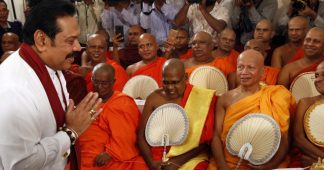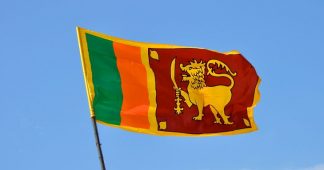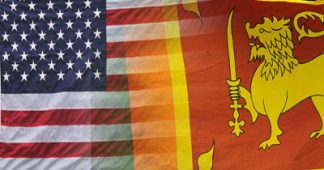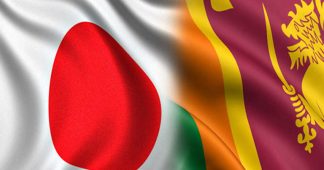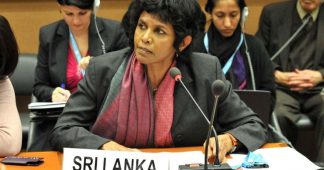By
No one following Sri Lanka could pretend that the partnership forged in 2015 between President Maithripala Sirisena and Prime Minister Ranil Wickremesinghe was either affectionate or wildly successful. Yet at least the Sri Lankan leaders seemed to understand the logic that, when you’re trying to get out of a hole, stop digging: Sirisena and Wickremesinghe oversaw halting (if insufficient) steps toward addressing issues of accountability, missing persons, governance, and land usage arising during the previous 10 years under President Mahinda Rajapaksa. Credible allegations of human rights atrocities under Rajapaksa soared during the culmination of the government’s scorched-earth campaign against the Tamil Tigers in May 2009. Indeed, both Sirisena, in his January 2015 upset, and Wickremesinghe’s parliamentary coalition, later that summer, won their elections on promises of anti-Rajapaksa policies and of reconciliation between Sri Lanka’s Sinhalese Buddhist majority and its minorities, especially the Tamils.
In mid-March 2018, I was in Sri Lanka during the worst ethnic violence in years: For four days, extremist Sinhalese Buddhist mobs attacked and burned Muslim homes, shops, and mosques in the central city of Kandy. Even during this national emergency, the president and prime minister refused to speak directly to each other. So the surprise is not that Sirisena tried to change the prime minister but rather that Rajapaksa—a populist leader dismissive of rule of law, with a Trump-like following—was his choice as Wickremesinghe’s successor. With Wickremesinghe insisting he, not Rajapaksa, remains the legitimate prime minister despite being sacked by the president, Sri Lanka now has two claimants to the premiership. The resolution of this has domestic, regional, and international ramifications.
By his curious selection of Rajapaksa, Sirisena marches toward political suicide, no matter whether Rajapaksa or Wickremesinghe prevails as prime minister. Wickremesinghe calculates he can show that his government maintains at least 113 (out of 225) members of parliament. If he remains in office, he will surely seek an opportunity to punish Sirisena through impeachment, and he will certainly withhold essential support, should Sirisena seek re-election in 2020.
If, on the other hand, Rajapaksa becomes the unchallenged prime minister, he has at least four paths to snatching the executive powers he once possessed from Sirisena:
- First, a successful impeachment of Sirisena would create a presidential vacuum that, constitutionally, Sri Lanka’s prime minister fills for the remainder of the term. (While Sri Lanka allows only two five-year presidential terms, pro-Rajapaksa judges could rule that term limits apply to elections, not vacancies.)
- Second, with a successful impeachment of Sirisena, Rajapaksa could maneuver one of his brothers into the presidency, retaining both top positions as a mafia-like family business.
- Third, Rajapaksa could back a proposal he rejected while president, the abolishment of the current executive presidency in favor of a ceremonial president and empowered prime minister he would retain.
- Fourth, and easiest, Rajapaksa, never one to flinch in the face of legal restraints or standards, could simply usurp in practice presidential powers by virtue of the hero status and popularity he, not Sirisena, enjoys among many of the Sinhalese majority in Sri Lanka.
As demonstrated by some violence already, Sri Lanka’s fragile peace and incomplete reconciliation are at risk with Sirisena’s appointment of Rajapaksa. The most serious threat is to the imperfect and incomplete Sinhalese-Tamil reconciliation. The Tamil National Alliance (TNA), by refusing to join the coalition government, is classified as the largest opposition bloc in the parliament. But in practice, the TNA has supported the Wickremesinghe government—at some expense to the credibility among the Tamils of the moderate TNA leaders, given Tamil disappointment over unfilled campaign promises regarding devolution of power to local and regional levels. Rajapaksa’s return will reignite Tamil fears and could invigorate more extremist Tamil leaders—a dangerous phenomenon which, in a vicious downward cycle, would be used by some Sinhalese Buddhist politicians to justify extremist anti-minority policies. It hardly seems coincidental that, just days after Sirisena appointed Rajapaksa, Sri Lankan judges released on bail Amith Weeresinghe, the Buddhist extremist who served as the primary instigator behind the March 2018 Buddhist rampage against the Muslim community in Kandy.
Internationally, the Sirisena-Wickremesinghe leadership took steps to reverse the pariah status Sri Lanka had acquired in much of the world under Rajapaksa. The government expressed a willingness to work with the United Nations, including the High Commissioner for Human Rights, on efforts to align national laws and initiatives with international standards. While gaps persisted between promises and delivery, Sri Lanka started to play again a significant role on the international stage, by returning to participation in U.N. peacekeeping and by U.N. Secretary-General António Guterres’ appointment in October 2017 of Jayathma Wickramanayake as U.N. Youth Envoy. It is hard to imagine the cooperative, positive relationship with the international community continuing under a Rajapaksa government, and an unconstitutional change of government would automatically cut off Sri Lanka’s peacekeeping role. Regionally, under Rajapaksa, Sri Lanka’s foreign policy tilted heavily toward China at the expense of relations with India, the United States and others. Having Sri Lanka become again in essence an offshore dependency of China would have negative repercussions on Sri Lanka’s internal harmony and on the shipping and security interests of other traditional partners of Sri Lanka. Arguably, as prime minister, Rajapaksa could pursue a different domestic agenda and foreign policy than he did as president. But his followers and opponents alike would need to see strong evidence to believe that.
Ultimately, whether Rajapaksa or Wickremesinghe has a parliamentary majority is a question only Sri Lanka’s members of parliament can answer. The sooner a parliamentary vote on who is prime minister can take place, the better, given predictable attempts by Rajapaksa’s forces to intimidate and bribe (some say with Chinese funds) and the risks of tensions and instability turning violent in the current climate. In a move some have called constitutionally illegitimate because of his failure to consult the parliament speaker in advance, President Sirisena, in dismissing Wickremesinge, also suspended parliament until November 16—which would seem an unnecessary step, if Rajapaksa truly commanded a majority. In response, Parliament Speaker Karu Jayasuriya has called for meetings of the parliamentary blocs on Friday, November 2. If Sirisena, in his commander-in-chief role, or Rajapaksa, through popular mobilization, employ force or violence to prevent this parliamentary bloc meeting, the sporadic violence that has broken out since Rajapaksa’s appointment could become widespread.
In nearly six years of working at the United Nations, I participated in many hand-wringing discussions inside the U.N. Secretariat and with member state representatives about our collective failure to prevent conflict. Billions are spent on peacekeeping and reconstruction after conflict breaks out, after lives and societies are destroyed, while conflict prevention remains neglected. This week, Sri Lanka seems to be the perfect case for the U.N. and for Sri Lanka’s many friends in the international community to focus on conflict prevention. The message is simple but important: Parliament needs to meet soon, without intimidation and violence, and parliament’s decision, per Sri Lanka’s constitution, needs to be respected. Sri Lankans, after 25 years of domestic terrorism and civil ethnic war, should understand the need for peaceful resolution of political conflicts, and the international community can play a useful role in reminding the Sri Lankan leadership of that fact. As has been well documented, the U.N. failed in 2009 to raise the alarm bells about the atrocities committed in the final stages of the Rapapaksa defeat of the Tamil Tigers. By a strong preventive diplomacy role now, the U.N. can demonstrate it has absorbed lessons from that failure.
* is an American diplomat and former United Nations Under-Secretary-General for Political Affairs
